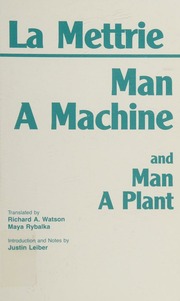
Man a Machine and Man a Plant
References and Quotes
Conceptions of emptiness to be filled as the foundation metaphor of schooling are not confined to hollowness and plasticity, but also include theories of mechanism. De La Mettrie’s1 Man a Machine vision from the Enlightenment, for instance, is evidence of an idea regularly recurring for millennia. If we are mechanisms, we must be predetermined, as Calvin said. Then the whole notion of "Education" is nonsensical. There is no independent inner essence to be drawn forth and developed. Only adjustments are possible, and if the contraption doesn’t work right, it should be junked. Everything important about machinery is superficial.
Julien Offray de La Mettrie (1709–1751) was the earliest of the materialistic writers of the Enlightenment. His conclusion that religious thought was a physical disorder akin to fever forced him to flee France. In the middle of the eighteenth century his two master works, Man a Machine and Man a Plant, stated principles which are self-evident from the titles. The ethics of these principles are worked out in later essays. The purpose of life is to pleasure the senses, virtue is measured by self-love, the hope of the world lies in the spread of atheism. De La Mettrie was compelled to flee the Netherlands and accept the protection of Frederick of Prussia in 1748. The chief authority for his life is an eulogy entitled "The Elegy," written by Frederick II himself.